
Let's be honest, the whole "AI is coming for our jobs" conversation is getting a little old. The real story isn't about AI replacing people it's about how it can work with them to make work less of a grind. The smartest companies are figuring this out. They're not just making their employees sit through slide decks about AI; they're using AI that learns from their company's own knowledge to make every team better and faster.
Think of it this way: instead of just teaching your team, you teach an AI to handle the repetitive stuff. That way, your team can focus on the work that actually requires a human brain.
This article breaks down the best AI education platforms out there in 2025. We'll look at the old-school tools for employee training and, more importantly, the new wave of platforms that create AI assistants from your own company data. You'll get a straight-up comparison of the top 7 platforms, a guide on how to pick the right one, and some practical tips you can use right away.
What are AI education platforms?
When you hear "AI education platform," you probably think of a Learning Management System (LMS) that uses AI to personalize courses or generate quizzes. And you're not wrong. Platforms like WorkRamp use AI to help L&D managers create training modules more efficiently. They're solid choices for formal, structured learning.
But there’s a new, more hands-on way to think about it. A different kind of AI education platform focuses on teaching an AI model using your company’s unique knowledge. This AI then becomes an automated agent or assistant that upskills your team by handling boring tasks and giving instant, accurate answers pulled from your company's collective brain.
Instead of spending months building training courses, these platforms plug into the places your knowledge already lives, your help center, old support tickets, internal wikis, you name it. For example, eesel AI creates an AI that learns all that information and puts it to work in real-time. It’s a much faster way to improve your team's performance because you're not just training your people; you're giving them a system that does the grunt work for them.

How we chose the best AI education platforms
So, how did we pick the platforms on this list? We skipped the academic fluff and focused on what actually helps a business. Our checklist was pretty simple:
- Solves a real business problem: The platform had to be good for more than just a check-mark on a training report. It needed to improve things like customer support speed, IT automation, or just getting quick answers to internal questions.
- Plays well with your existing tools: It should connect easily with the software you already depend on (like Zendesk, Slack, and Confluence) without making you move all your data.
- Actually learns your stuff: We looked at how well the AI could learn from company-specific knowledge. Platforms that could make sense of messy, unstructured data like past support chats and random docs got bonus points.
- Gets you results, fast: We favored platforms that you can set up quickly and see a real return on, whether that’s in time saved or happier customers.
Comparison of the top AI education platforms in 2025
| Feature | eesel AI | WorkRamp | Sana Labs | 360Learning | Century Tech | Cognii | Amira Learning |
|---|---|---|---|---|---|---|---|
| Best For | Support & IT Automation | Formal L&D Courses | Corporate Upskilling | Collaborative Learning | K-12 Personalized Plans | Writing Assessment | K-6 Reading Fluency |
| Learns from Tickets | ✅ | ❌ | ❌ | ❌ | ❌ | ❌ | ❌ |
| Help Desk Integration | ✅ | Limited | ❌ | Limited | ❌ | ✅ | ❌ |
| No-Migration Setup | ✅ | - | - | - | - | ✅ | ✅ |
| Automates Actions | ✅ | ❌ | ❌ | ❌ | ❌ | ❌ | ❌ |
| Starting Price | $239/mo (annual) | Custom | Custom | Custom | Custom | Custom | Custom |
The 7 best AI education platforms for businesses
This list covers a mix of platforms, from tools that automate parts of your business to those that are more about traditional training. The goal is to help you find the right tool for whatever "upskilling" means to you whether that’s training your people or training an AI to help them.
1. eesel AI
eesel AI takes a different approach to being an AI education platform. Instead of making you build courses, you teach an AI agent using your own company knowledge. It connects directly to all your current knowledge sources like old Zendesk tickets, Confluence docs, and Slack conversations to build an AI assistant. This assistant can then resolve support tickets on its own, answer internal questions, and draft replies for your human agents. It works as an intelligent layer on top of your existing help desk, so you don't have to switch tools.
Key Features:
- AI Agent: Handles frontline support by answering questions and closing tickets. It can also do things like tag tickets or route them to the right person.
- AI Copilot: Lives inside your help desk to help human agents by drafting accurate, on-brand replies based on past conversations.
- Broad Integrations: Connects to over 100 tools, including all the major help desks, wikis, and chat apps.
- Simulation Mode: Lets you test the AI's accuracy on your past tickets before you turn it on for customers. This way, you can see the potential ROI from day one.
Pricing: Plans start at $239/month (billed annually) for the Team plan, which covers up to 1,000 AI interactions.
Best for: Businesses that want to make their support and IT teams more productive by automating repetitive work, not by building formal training courses.
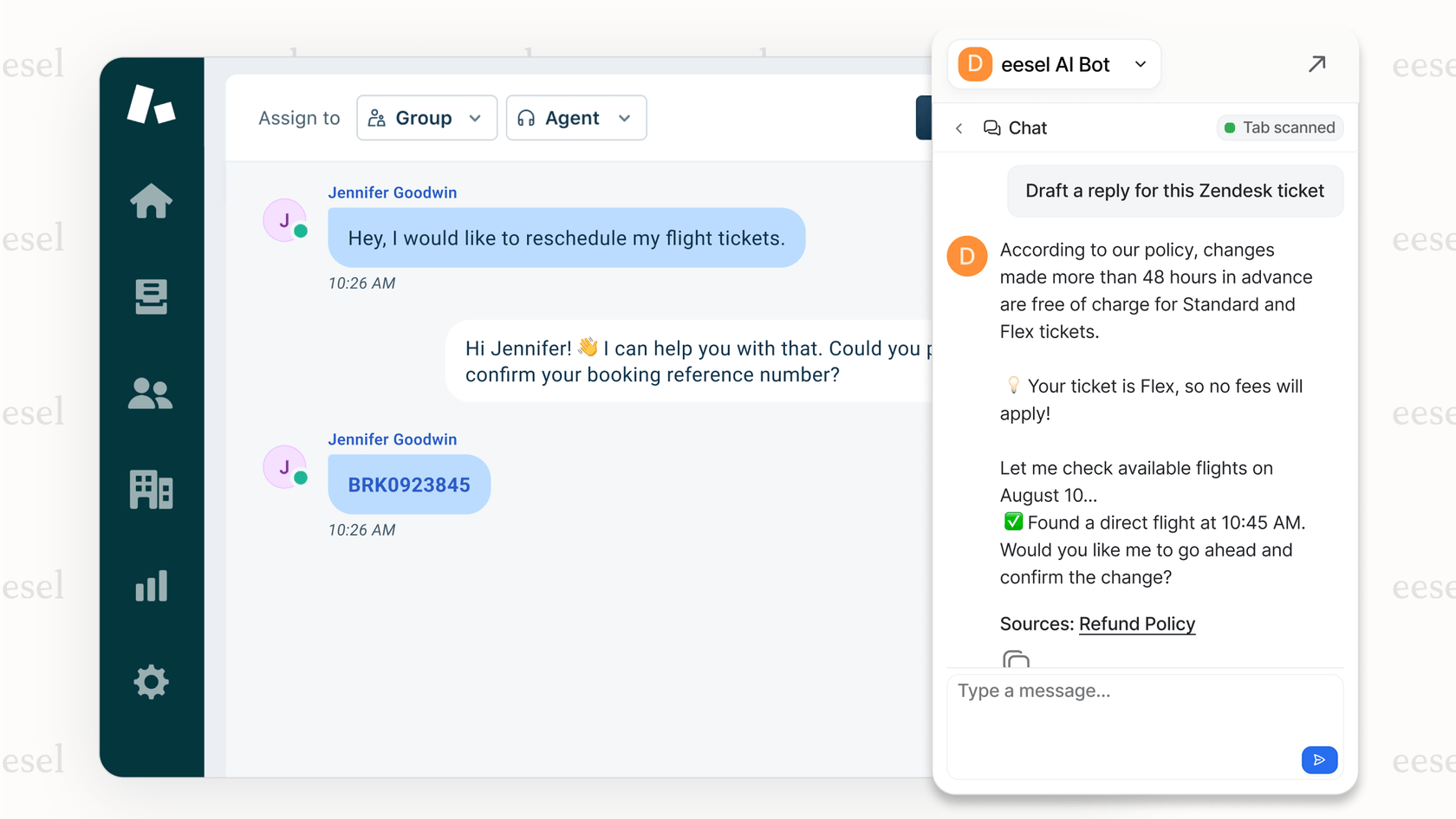
2. WorkRamp
WorkRamp is a full-featured Learning Management System (LMS) that uses AI to help companies create and manage training for employees, customers, and partners. Its AI tools focus on making content creation easier, personalizing learning paths, and even simulating role-play for sales training. It's a heavy-duty tool for organizations that need one place to manage all their formal learning programs.
Key Features: AI Assist for generating course content, customizable learning paths, AI-powered role-playing, and integrations with HR platforms like BambooHR.
Pricing: You have to request a demo to get custom pricing.
Best for: Companies looking for a traditional LMS to run structured training programs for various audiences.
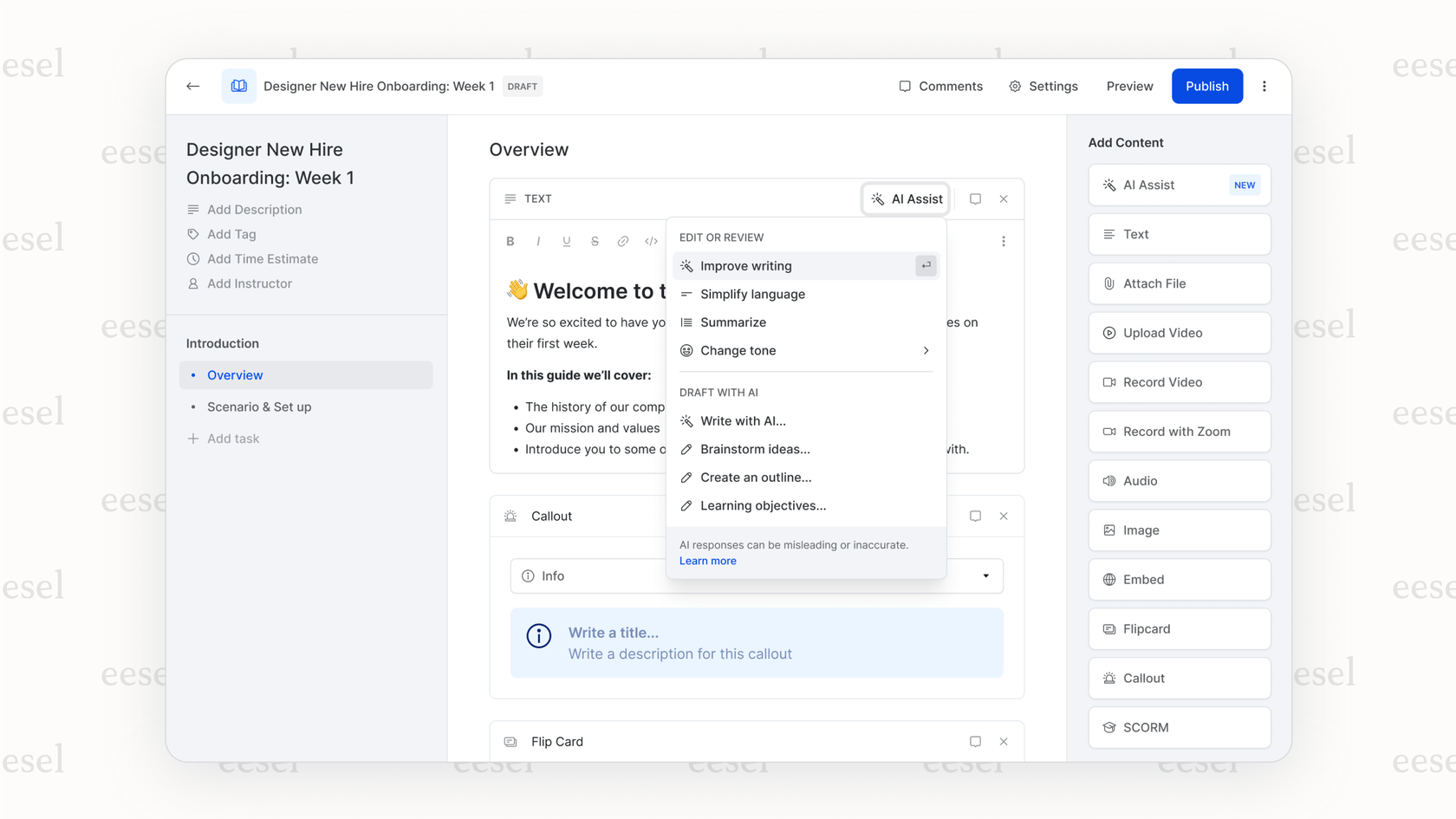
3. Sana Labs
Sana Labs is an AI-powered learning platform built for corporate upskilling. It tailors learning content to each employee based on their job and progress, using AI to suggest relevant articles, videos, and courses. Its main strength is creating learning experiences that feel personal, which makes it a good option for large companies.
Key Features: Personalized learning paths, a content recommendation engine, progress analytics, and integrations with HR systems.
Pricing: Custom pricing, available by contacting their sales team.
Best for: Big companies that want to offer personalized professional development by curating content for their workforce.
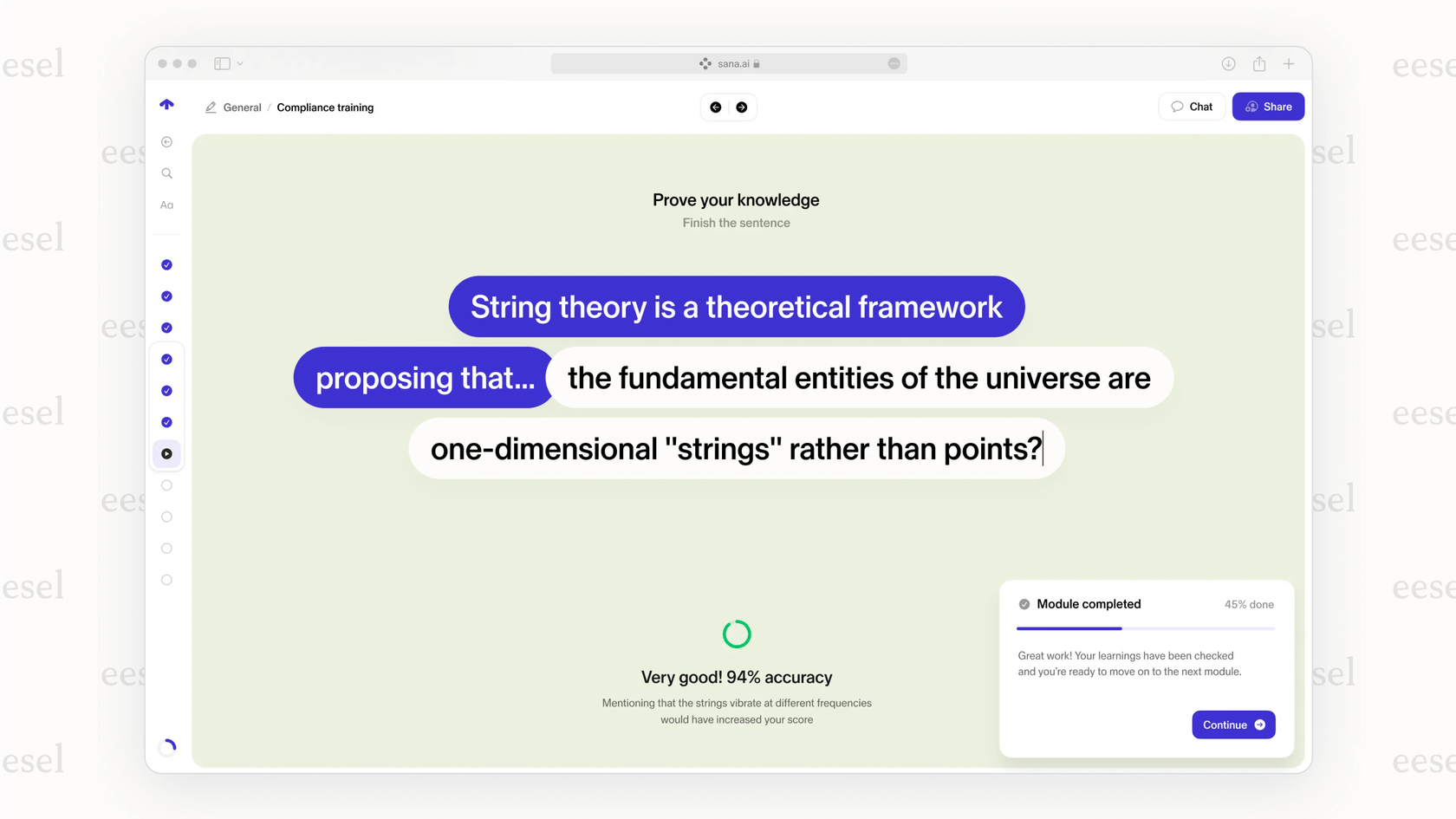
4. 360Learning
360Learning is a platform centered on collaborative learning, letting teams create and share knowledge internally. It uses AI to speed up course creation, suggest content, and translate materials for teams across the globe. The whole idea behind it is peer-to-peer learning, where anyone in the company can share what they know.
Key Features: An AI-powered course builder, collaborative editing tools, content translation, and skill-based content suggestions.
Pricing: They offer a free trial, but paid plans require a custom quote.
Best for: Companies that want to encourage a culture where experts inside the business can easily create and share their own training.
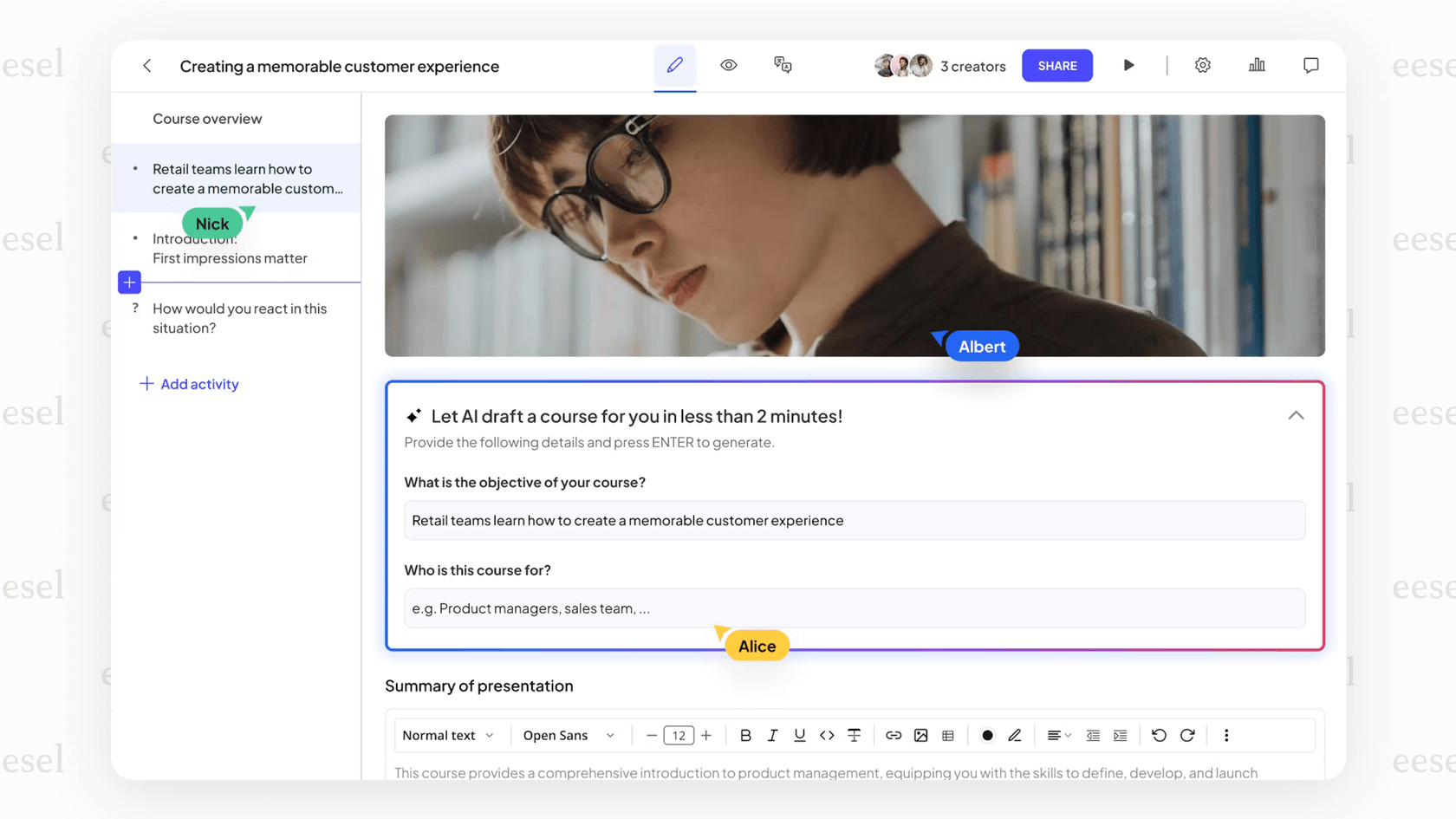
5. Century Tech
Century Tech uses AI and cognitive neuroscience to build personalized learning plans for students from K-12 to higher education. The platform figures out what a student knows in real-time, finds any knowledge gaps, and serves up micro-lessons to help. It's built to take work off teachers' plates by automating things like grading and lesson planning.
Key Features: Neuroscience-based AI, real-time performance tracking, automated lesson recommendations, and teacher dashboards.
Pricing: Custom pricing for schools and institutions.
Best for: Schools and universities that want to give students truly adaptive learning plans at a large scale.
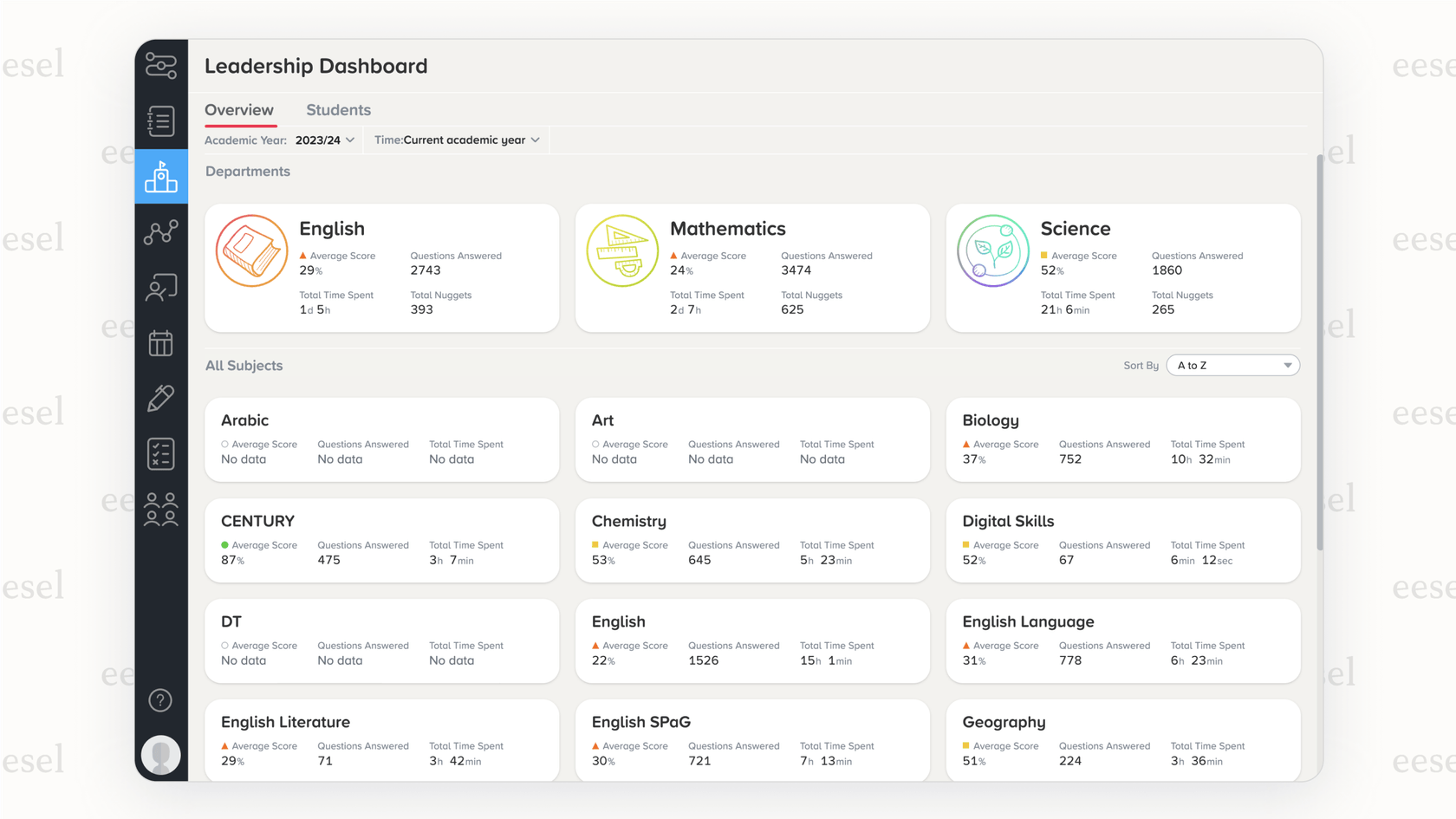
6. Cognii
Cognii is all about AI-powered assessment. It uses natural language processing (NLP) to grade students' written answers, giving them instant, personalized feedback on essays and short responses. It helps students improve their writing skills while saving teachers a ton of time on grading.
Key Features: AI-powered writing assessment, real-time feedback, LMS integrations, and support for open-ended questions.
Pricing: Custom pricing for educational and corporate customers.
Best for: Organizations and educators who need to automate grading for written work and give helpful feedback to a lot of people.
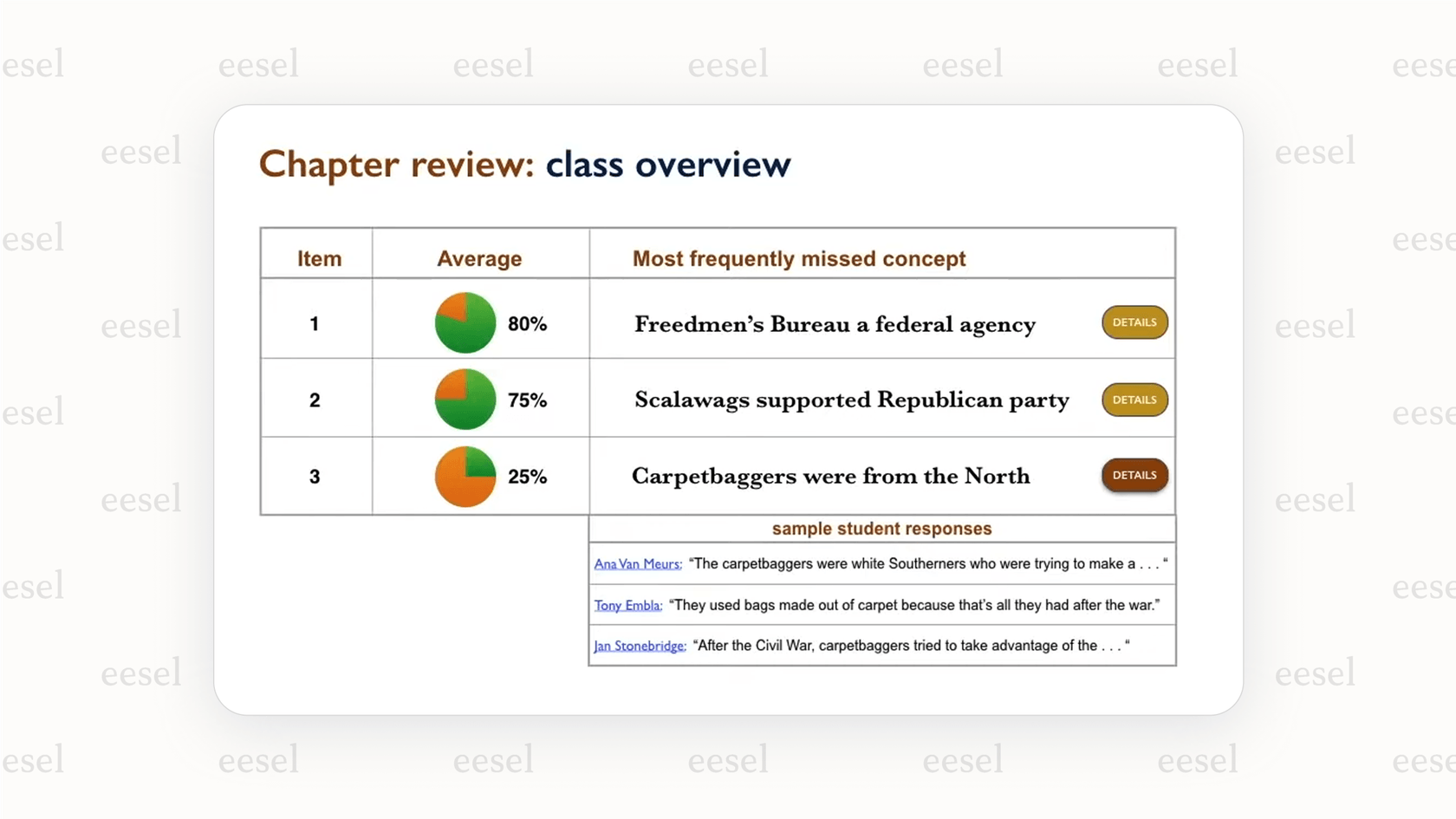
7. Amira Learning
Amira Learning is an AI reading assistant for kids in kindergarten through 6th grade. It listens to a child read, checks their fluency, and offers real-time tutoring. As one of the most specialized AI education platforms on our list, it's designed to screen for dyslexia and help kids become more confident readers.
Key Features: AI-driven reading fluency assessment, real-time tutoring, dyslexia screening, and progress reports for teachers.
Pricing: Custom pricing for school districts.
Best for: Elementary schools and literacy programs aiming to improve early reading skills.
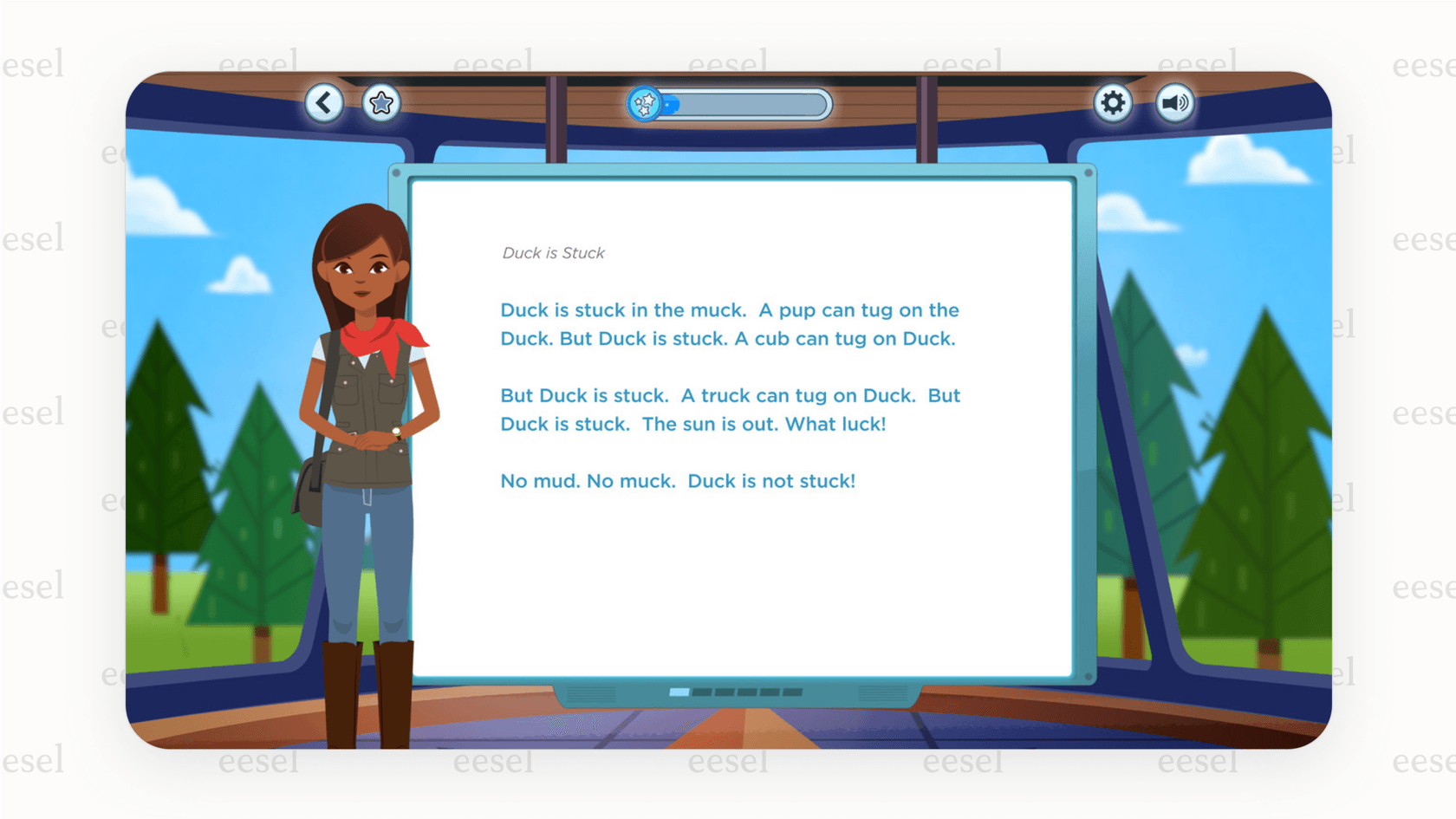
How to choose the right ai education platforms for your business
Okay, so how do you pick the one for you? It really just depends on what you need to get done. Here are a few pointers.
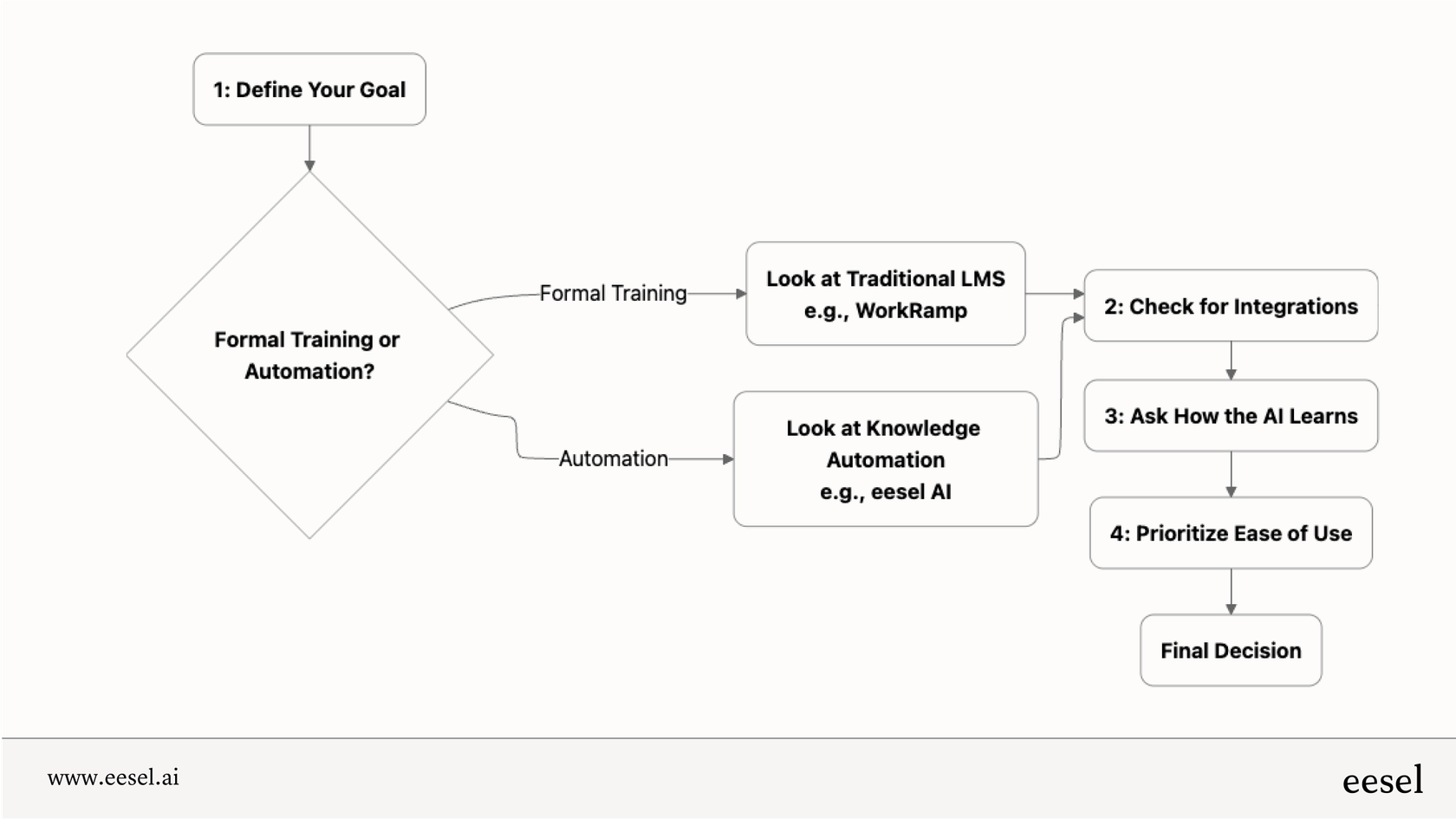
- Pro Tip 1: Figure out what "upskilling" really means to you. Are you trying to run formal training courses with completion rates and certifications? A traditional LMS like WorkRamp is probably what you need. Or is your goal to automate repetitive work and give your team real-time help? In that case, a knowledge automation platform like eesel AI will get you there faster. Your goal decides the tool.
- Pro Tip 2: Make sure it works with your current tools. The best platforms don't make you start from scratch. Look for solutions that act as a smart layer on top of what you already have. This saves a lot of headaches and helps you see results much quicker.
- Pro Tip 3: Ask how the AI actually learns. Can it make sense of messy data, like old chat logs or half-finished documents? More importantly, can you test how good it is before letting it talk to customers? A platform that gives you a "simulation" mode offers peace of mind that your investment will actually work.
- Pro Tip 4: Think about the person using it. Whether it's an employee taking a course or a support agent getting an AI-drafted reply, the tool should be simple and fit right into their daily routine. The less they have to think about it, the better.
Empower your teams with self-learning ai education platforms that work for you
In 2025, the best AI education platforms are more than just digital course catalogs. They're practical tools that learn how your business works and start adding value almost immediately.
Whether you're training a person or an AI agent, the goal is the same: create an expert that can get the job done right. Platforms that automate this learning from the knowledge you already have are the fastest way to build a smarter, more efficient team.
If you're ready to give your support and IT teams an AI assistant that learns from your existing tools, try eesel AI for free or book a demo to see how it works.
Frequently asked questions
It really depends on your main goal. If you need formal, structured training with course creation and tracking, a traditional LMS is best. If you want to automate repetitive work and provide instant help to your team, a knowledge automation platform that learns from your existing data is the right choice.
It varies quite a bit. Traditional LMS platforms can require more L&D expertise to build courses, while newer knowledge automation platforms are often no-code. Many allow you to connect your existing tools like Zendesk or Slack with just a few clicks, no engineering help needed.
They're designed for businesses of all sizes. Many modern platforms offer scalable pricing models that charge based on usage or interactions instead of a high per-user fee. This makes them accessible for small teams looking to improve efficiency just as much as large enterprises.
For automation-focused platforms, track concrete metrics like the percentage of support tickets resolved by the AI, time saved by human agents, and customer satisfaction scores. For training platforms, you can measure things like faster employee onboarding or higher course completion rates.
Reputable platforms make security a top priority, using measures like SOC 2 compliance and data encryption. Before choosing a provider, always check that their privacy policy guarantees your data won't be used to train models for other customers.
The most common mistake is choosing a tool before clearly defining the problem you're trying to solve. You should first decide if you need to improve formal training or automate a specific workflow, then find a platform that excels at that one thing.
Share this post

Article by
Stevia Putri
Stevia Putri is a marketing generalist at eesel AI, where she helps turn powerful AI tools into stories that resonate. She’s driven by curiosity, clarity, and the human side of technology.






